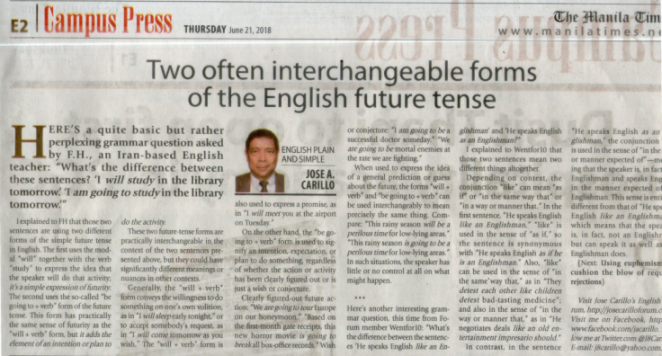Here’s a quite basic but rather perplexing grammar question asked by F.H., an Iran-based English teacher: “What’s the difference between these sentences? ‘
I will study in the library tomorrow.’ ‘
I am going to study in the library tomorrow.’”
I explained to FH that those two sentences are using two different forms of the simple future tense in English. The first uses the modal “will” together with the verb “study” to express the idea that the speaker will do that activity;
it’s a simple expression of futurity. The second uses the so-called “be going to + verb” form of the future tense. This form has practically the same sense of futurity as the “will + verb” form, but
it adds the element of an intention or plan to do the activity.
IMAGE CREDIT: MEDIUM.COM/@MIT.BIET/SINGAPORE-DIARIESTO GET THERE, “YOU WILL…” OR “YOU ARE GOING TO…”?
These two future-tense forms are practically interchangeable in the context of the two sentences presented above, but they could have significantly different meanings or nuances in other contexts.
Generally, the “will + verb” form conveys the willingness to do something on one’s own volition, as in “
I will sleep early tonight,” or to accept somebody’s request, as in “
I will come tomorrow as you wish.” The “will + verb” form is also used to express a promise, as in “
I will meet you at the airport on Tuesday.”
On the other hand, the “be going to + verb” form is used to signify an intention, expectation, or plan to do something, regardless of whether the action or activity has been clearly figured out or is just a wish or conjecture.
Clearly figured-out future action: “
We are going to tour Europe on our honeymoon.” “Based on the first-month gate receipts,
this new horror movie is going to break all box-office records.”
Wish or conjecture: “
I am going to be a successful doctor someday.” “
We are going to be mortal enemies at the rate we are fighting.”
When used to express the idea of a general prediction or guess about the future, the forms “will + verb” and “be going to + verb” can be used interchangeably to mean precisely the same thing.
Compare this sentence: “This rainy season
will be a perilous time for low-lying areas.” With this sentence: “This rainy season
is going to be a perilous time for low-lying areas.” In such situations, the speaker has little or no control at all on what might happen.
***
Here’s another interesting grammar question, this time from Forum member Wentfor10: “What’s the difference between the sentences ‘He speaks English
like an Englishman’ and ‘He speaks English
as an Englishman?’”
I explained to Wentfor10 that those two sentences mean two different things altogether.
Depending on context, the conjunction “like” can mean “as if” or “in the same way that” or “in a way or manner that.” In the first sentence, “He speaks English
like an Englishman,” “like” is used in the sense of “as if,” so the sentence is synonymous with “He speaks English
as if he is an Englishman.” Also, “like” can be used in the sense of “in the same way that,” as in “They detest each other
like children detest bad-tasting medicine”; and also in the sense of “in the way or manner that,” as in “He negotiates deals
like an old entertainment impresario should.”
In contrast, in the sentence “He speaks English
as an Englishman,” the conjunction “as” is used in the sense of “in the way or manner expected of”—meaning that the speaker is, in fact, an Englishman and speaks English in the manner expected of an Englishman. This sense is entirely different from that of “He speaks English
like an Englishman,” which means that the speaker is, in fact, not an Englishman but can speak it as well as an Englishman does.
 This essay, 1097th of the series, appeared in the column “English Plain and Simple” by Jose A. Carillo in the Campus Press section of the June 21, 2018 issue (print edition only) of
This essay, 1097th of the series, appeared in the column “English Plain and Simple” by Jose A. Carillo in the Campus Press section of the June 21, 2018 issue (print edition only) of The Manila Times
, © 2018 by the Manila Times Publishing Corp. All rights reserved.(Next:
Using euphemism to cushion the blow of request rejections) June 28, 2018